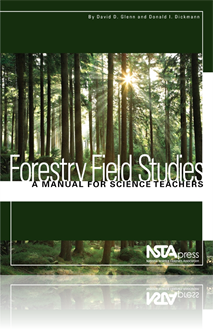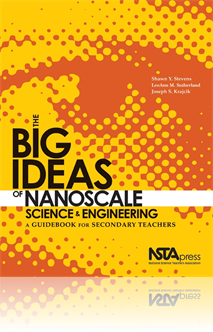All Book Chapters
Book Chapter
Students are out of the field and back into the classroom. In this chapter, students are provided with a Forestry Data Summary Sheet to help them focus on all the computations, sketches, charts, and data they need to construct and write their report....
Book Chapter
The Foundational Science Content
Four of the big ideas represent the basic science content: Size and Scale, Structure of Matter, Forces and Interactions, and Quantum Effects. And all four are interrelated. None of the science-content big ideas stands alone; each informs and is info...
Book Chapter
Self-assembly is the process of matter organizing autonomously and without human intervention (Whitesides, Mathias, and Seto 1991; Withesides and Boncheva 2002). The process of self-assembly can be introduced in a range of contexts in the natural and...
Book Chapter
Development of new tools and instruments helps drive scientific progress. Recent development of specialized tools has led to new levels of understanding of matter by helping scientists detect, manipulate, isolate, measure, fabricate, and investigate ...
Book Chapter
Scientists use models and simulations to help them visualize, explain, and make predictions and hypotheses about the structures, properties, and behaviors of phenomena (e.g., objects, materials, processes, systems). The extremely small size and compl...
Book Chapter
Science, Technology, and Society
The advancement of science involves developing explanations for how and why things work and using technology to apply that knowledge to meet objectives, solve problems, or answer questions of societal interest. Because nanotechnology is an emergent s...
Book Chapter
As our society becomes more dependent on nanoscale science and engineering (NSE) technologies, children globally will grow up in a world in which they will need to apply NSE ideas. Without a firm understanding of NSE big ideas, young people will not ...
Book Chapter
Applying the Foundational Science Content
The four big ideas discussed in Chapter 1 provide the foundation for developing understanding of nanoscale phenomena. Two additional big ideas—Size-Dependent Properties and Self-Assembly—require learners to apply concepts from some or all of the ...
Book Chapter
The six big ideas of NSE discussed so far have been directly related to science content necessary for understanding nanoscale phenomena. The two big ideas in this chapter—Tools and Instrumentation and Models and Simulations—are critical for advan...
Book Chapter
The final big idea of NSE is different from the others. It describes the natures of science and technology and how society affects and is affected by scientific and technological advancement. Thus the Science, Technology, and Society big idea is link...
Book Chapter
Concepts relating to size and scale (and geometry) affect students’ abilities to build understanding in a variety of scientific disciplines, including developing conceptual understanding of nanoscale phenomena. Ideally, concepts related to size and...
Book Chapter
Materials consist of building blocks that often form a hierarchy of structures. Atoms interact with each other to form molecules. The next higher level of organization involves atoms, molecules, or nanoscale structures interacting with each other to ...
Book Chapter
The content related to forces and interactions is important to most science disciplines. While chemistry is the most obvious place to introduce these ideas, it is important to connect aspects of this big idea to phenomena in biology, physics, and Ear...
Book Chapter
Quantum theory is an extremely advanced and complicated model. However, some aspects are accessible and useful for building an appreciation and understanding of the novel properties exhibited by matter at the nanoscale. In this chapter, the authors p...
Book Chapter
The properties of matter can change with scale. In particular, during the transition between the bulk material and individual atoms or molecules, a material often exhibits unexpected properties that lead to new functionality. This transition generall...



